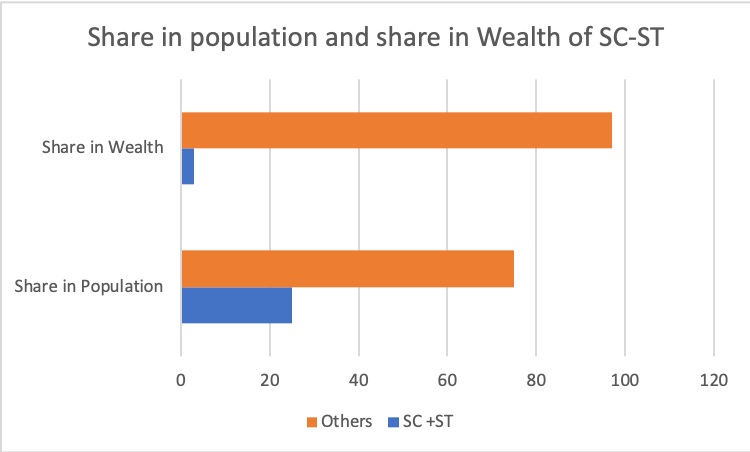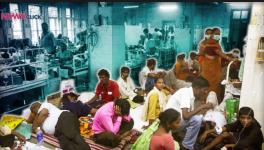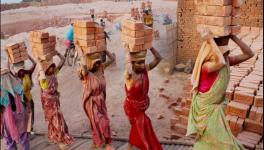Survival of the Privileged: Why Budget ’24 Matters to the Marginalised
While Oxfam’s recent report, Survival of the Richest: The India Supplement, deals with growing inequality, it also highlights the underlying caste basis of this inequality. The report points to the persistent disparities India’s Scheduled Castes and Scheduled Tribes (SC/ST) population face. It reveals the contrast between the share of the population of the SC/STs and their low access to wealth. The report, released on 15 January, shows the stark inequalities that haunt these marginalised communities.
SC/ST communities comprise over 25% of India’s population yet hold just 3% of its wealth. This gap is even more pronounced compared with the top 1% of the wealthiest individuals in India, where SC/ST representation is non-existent. Such inequality reflects in their lack of access to health, education, and broader labour markets. Effectively, it pushes the marginalised further toward the margins.
Figure 1: Share in population and share in wealth of SC/STs.

Source: Oxfam Inequality Report: The India Supplement
The report highlights the dire living conditions of many SC/ST families, with high poverty rates and poor access to basic needs such as education and healthcare. This inequality has led to a cycle of intergenerational poverty, which has forced SC/ST children to confront significant barriers to their upward mobility and economic advancement.
The disparities are not limited to rural areas, as traditionally believed, but also prevail in urban areas. According to the Oxfam report, the average wealth of SC/ST households in urban areas is just one-tenth that of households belonging to other castes. This gap is even more pronounced in terms of access to land and property, where SC/ST communities have significantly less access than others.
Another major contributor to the economic disparities is SC/ST communities’ lack of access to financial services. Many cannot access formal banking services, which leaves them with limited options to secure loans or invest in a business. Their lack of access to financial services significantly impacts their ability to grow an existing business, start a new one, or improve their chances of accessing economic opportunities.
Such inequalities are rooted in a long history of discrimination and marginalisation of SC/ST communities. Constitutional protections and affirmative action policies to address these issues, the report argues, have been insufficient to address India’s persistent structural inequalities. While the government is supposed to play a transformative role in remedying this gross inequality, it washes its hands off all responsibility. The foremost instance is the disinvestment policy and privatisation of Public Sector Units or PSUs, which has denied members of marginalised groups employment opportunities. In PSUs that are privatised, reservation policies lose their applicability. Reservations in jobs create opportunities and, more importantly, serve a critical socio-economic purpose to empower and uplift marginalised groups.
The COVID-19 pandemic exacerbated the crisis for the SC/ST communities, which were disproportionately affected by the economic fallout of India’s ill-managed lockdowns. Oxfam has said the pandemic significantly impacted the informal sector, where most SC/ST individuals are employed. The state offered no support to individuals who lost their jobs even as they struggled to survive.
The two Union budgets that followed the pandemic should have taken cognisance of this economic and social crisis and increased the budgetary allocations to public health, education and schemes like MG-NREGA. Instead, we witnessed the contrary. Take the example of the Mid-Day Meal Scheme, which could have offered some much-needed support to students from marginalised groups. The budget for this scheme, now rebranded as the Pradhan Mantri Poshan Shakti Nirman or PM-POSHAN, has, after accounting for inflation, decreased by almost a third. Similarly, the government discontinued the Pre-Matric Scholarship Scheme for SC, ST, and OBC (Other Backward Classes) students right when it became critical and they needed its support the most. Students of Class 1 to Class 8 from marginalised backgrounds, who have been forced out of education due to the pandemic and the lockdown, now have no recourse to this scholarship.
Figure 2: Overall Wealth Inequality Over the Years
Sources: Data from 1961 to 2012 is from the Wealth Inequality Database. Data for 2020 and 2023 is from Oxfam India. Wealth data for India is from the ten-yearly Assets and Liabilities Survey of the National Sample Survey Organisation (NSS). The last round for which data is available is 2011-12. The yearly wealth estimates are extrapolated from the NSS data for the latest available year. (Accessed on 19 January.)
Oxfam’s findings are a stark reminder of the urgent need for action to address the persistent inequalities perpetuated against the SC/ST communities. It is high time the government takes note of this structural crisis and folows up with effective steps to ensure all members of society get an equal opportunity to succeed and thrive.
The Finance Minister is set to present the Union budget 2023-24 in the next few days, but does the government have the country’s most marginalised people on its mind? Oxfam’s report calls on the Indian government to take urgent action to address persistent inequalities faced by SC/ST communities through policies that redistribute wealth and expand access to essential services. It has also asked private companies to take responsibility for ensuring their operations do not expand these inequalities and actively work towards addressing them.
Kishan is a development economist working as a Research Fellow at the National Institute of Public Finance and Policy, Delhi. Anagha is a PhD candidate at the Centre for Political Studies, JNU and a councillor at JNUSU. The views are personal.
Get the latest reports & analysis with people's perspective on Protests, movements & deep analytical videos, discussions of the current affairs in your Telegram app. Subscribe to NewsClick's Telegram channel & get Real-Time updates on stories, as they get published on our website.
























